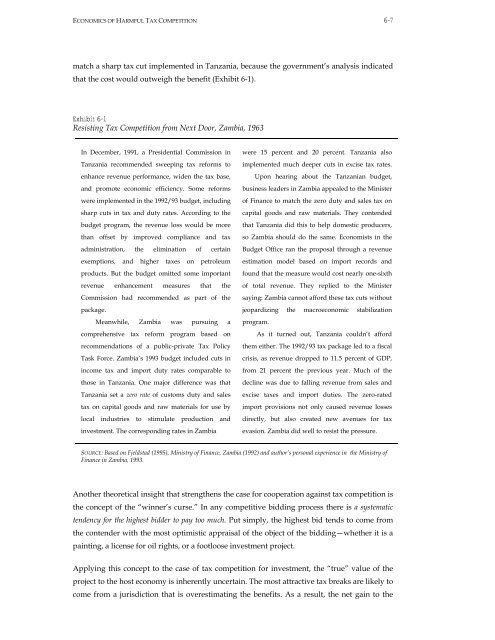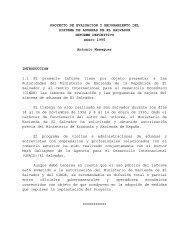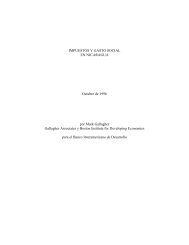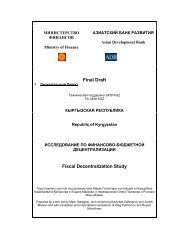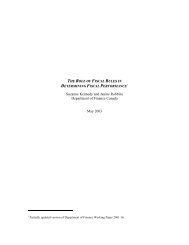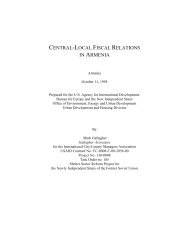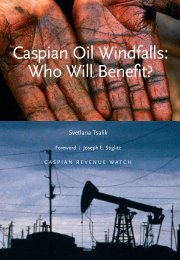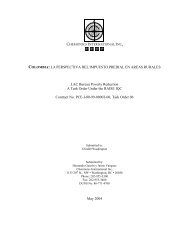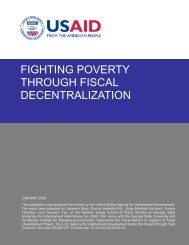Effectiveness and Economic Impact of Tax Incentives in the SADC ...
Effectiveness and Economic Impact of Tax Incentives in the SADC ...
Effectiveness and Economic Impact of Tax Incentives in the SADC ...
You also want an ePaper? Increase the reach of your titles
YUMPU automatically turns print PDFs into web optimized ePapers that Google loves.
ECONOMICS OF HARMFUL TAX COMPETITION 6-7<br />
match a sharp tax cut implemented <strong>in</strong> Tanzania, because <strong>the</strong> government’s analysis <strong>in</strong>dicated<br />
that <strong>the</strong> cost would outweigh <strong>the</strong> benefit (Exhibit 6-1).<br />
Exhibit 6-1<br />
Resist<strong>in</strong>g <strong>Tax</strong> Competition from Next Door, Zambia, 1963<br />
In December, 1991, a Presidential Commission <strong>in</strong><br />
Tanzania recommended sweep<strong>in</strong>g tax reforms to<br />
enhance revenue performance, widen <strong>the</strong> tax base,<br />
<strong>and</strong> promote economic efficiency. Some reforms<br />
were implemented <strong>in</strong> <strong>the</strong> 1992/93 budget, <strong>in</strong>clud<strong>in</strong>g<br />
sharp cuts <strong>in</strong> tax <strong>and</strong> duty rates. Accord<strong>in</strong>g to <strong>the</strong><br />
budget program, <strong>the</strong> revenue loss would be more<br />
than <strong>of</strong>fset by improved compliance <strong>and</strong> tax<br />
adm<strong>in</strong>istration, <strong>the</strong> elim<strong>in</strong>ation <strong>of</strong> certa<strong>in</strong><br />
exemptions, <strong>and</strong> higher taxes on petroleum<br />
products. But <strong>the</strong> budget omitted some important<br />
revenue enhancement measures that <strong>the</strong><br />
Commission had recommended as part <strong>of</strong> <strong>the</strong><br />
package.<br />
Meanwhile, Zambia was pursu<strong>in</strong>g a<br />
comprehensive tax reform program based on<br />
recommendations <strong>of</strong> a public-private <strong>Tax</strong> Policy<br />
Task Force. Zambia’s 1993 budget <strong>in</strong>cluded cuts <strong>in</strong><br />
<strong>in</strong>come tax <strong>and</strong> import duty rates comparable to<br />
those <strong>in</strong> Tanzania. One major difference was that<br />
Tanzania set a zero rate <strong>of</strong> customs duty <strong>and</strong> sales<br />
tax on capital goods <strong>and</strong> raw materials for use by<br />
local <strong>in</strong>dustries to stimulate production <strong>and</strong><br />
<strong>in</strong>vestment. The correspond<strong>in</strong>g rates <strong>in</strong> Zambia<br />
were 15 percent <strong>and</strong> 20 percent. Tanzania also<br />
implemented much deeper cuts <strong>in</strong> excise tax rates.<br />
Upon hear<strong>in</strong>g about <strong>the</strong> Tanzanian budget,<br />
bus<strong>in</strong>ess leaders <strong>in</strong> Zambia appealed to <strong>the</strong> M<strong>in</strong>ister<br />
<strong>of</strong> F<strong>in</strong>ance to match <strong>the</strong> zero duty <strong>and</strong> sales tax on<br />
capital goods <strong>and</strong> raw materials. They contended<br />
that Tanzania did this to help domestic producers,<br />
so Zambia should do <strong>the</strong> same. Economists <strong>in</strong> <strong>the</strong><br />
Budget Office ran <strong>the</strong> proposal through a revenue<br />
estimation model based on import records <strong>and</strong><br />
found that <strong>the</strong> measure would cost nearly one-sixth<br />
<strong>of</strong> total revenue. They replied to <strong>the</strong> M<strong>in</strong>ister<br />
say<strong>in</strong>g: Zambia cannot afford <strong>the</strong>se tax cuts without<br />
jeopardiz<strong>in</strong>g <strong>the</strong> macroeconomic stabilization<br />
program.<br />
As it turned out, Tanzania couldn’t afford<br />
<strong>the</strong>m ei<strong>the</strong>r. The 1992/93 tax package led to a fiscal<br />
crisis, as revenue dropped to 11.5 percent <strong>of</strong> GDP,<br />
from 21 percent <strong>the</strong> previous year. Much <strong>of</strong> <strong>the</strong><br />
decl<strong>in</strong>e was due to fall<strong>in</strong>g revenue from sales <strong>and</strong><br />
excise taxes <strong>and</strong> import duties. The zero-rated<br />
import provisions not only caused revenue losses<br />
directly, but also created new avenues for tax<br />
evasion. Zambia did well to resist <strong>the</strong> pressure.<br />
SOURCE: Based on Fjeldstad (1995), M<strong>in</strong>istry <strong>of</strong> F<strong>in</strong>ance, Zambia (1992) <strong>and</strong> author’s personal experience <strong>in</strong> <strong>the</strong> M<strong>in</strong>istry <strong>of</strong><br />
F<strong>in</strong>ance <strong>in</strong> Zambia, 1993.<br />
Ano<strong>the</strong>r <strong>the</strong>oretical <strong>in</strong>sight that streng<strong>the</strong>ns <strong>the</strong> case for cooperation aga<strong>in</strong>st tax competition is<br />
<strong>the</strong> concept <strong>of</strong> <strong>the</strong> “w<strong>in</strong>ner’s curse.” In any competitive bidd<strong>in</strong>g process <strong>the</strong>re is a systematic<br />
tendency for <strong>the</strong> highest bidder to pay too much. Put simply, <strong>the</strong> highest bid tends to come from<br />
<strong>the</strong> contender with <strong>the</strong> most optimistic appraisal <strong>of</strong> <strong>the</strong> object <strong>of</strong> <strong>the</strong> bidd<strong>in</strong>g—whe<strong>the</strong>r it is a<br />
pa<strong>in</strong>t<strong>in</strong>g, a license for oil rights, or a footloose <strong>in</strong>vestment project.<br />
Apply<strong>in</strong>g this concept to <strong>the</strong> case <strong>of</strong> tax competition for <strong>in</strong>vestment, <strong>the</strong> “true” value <strong>of</strong> <strong>the</strong><br />
project to <strong>the</strong> host economy is <strong>in</strong>herently uncerta<strong>in</strong>. The most attractive tax breaks are likely to<br />
come from a jurisdiction that is overestimat<strong>in</strong>g <strong>the</strong> benefits. As a result, <strong>the</strong> net ga<strong>in</strong> to <strong>the</strong>


